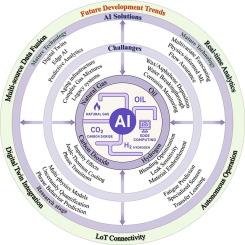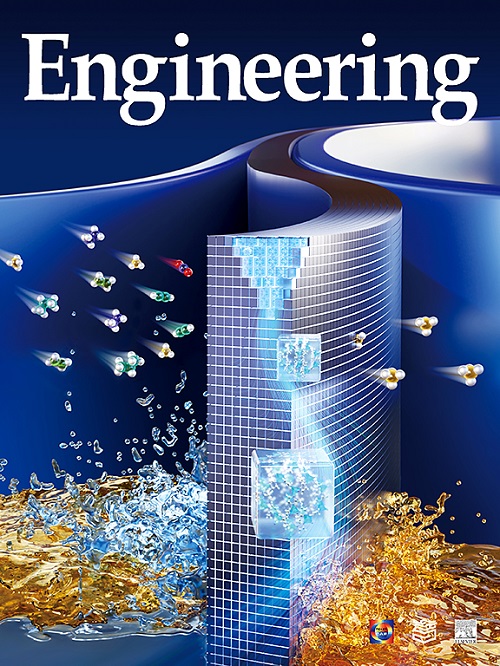能源管道中的人工智能:机遇与风险
IF 11.6
1区 工程技术
Q1 ENGINEERING, MULTIDISCIPLINARY
引用次数: 0
摘要
人工智能(AI)正在重塑石油、天然气、氢气、二氧化碳等能源管道的运营和管理。该综述对当前的发展进行了关键的综合,强调了人工智能如何在管道生命周期阶段(从路线设计和施工质量保证到运营、维护和最终退役)得到应用。深度学习、变压器架构、图形神经网络和物理信息模型的最新进展表明,与传统方法相比,该技术能够检测异常、优化多相流,并支持预测性维护,具有更强的适应性和鲁棒性。案例研究说明了工业运营商如何部署人工智能平台来提高效率、减少环境影响和增强系统弹性。除了这些机会,该评估还确定了系统性风险,包括数据偏差、算法不透明、网络安全漏洞和过度依赖自动化,并讨论了新兴的缓解策略,如合成数据生成、可解释的人工智能、纵深防御框架和混合主动人机协作。展望未来,该领域正朝着多源异构数据融合、面向数据稀缺环境的少射和迁移学习以及面向决策支持的因果推理的方向发展。人工智能在氢气和二氧化碳管道中的应用虽然刚刚起步,但为建设更安全、更可持续的基础设施提供了有希望的方向。这一综述强调了持续跨学科努力的必要性,以平衡创新与可靠性,确保人工智能成为全球能源转型中下一代管道系统的可信推动者。本文章由计算机程序翻译,如有差异,请以英文原文为准。

Artificial Intelligence in Energy Pipelines: Opportunities and Risks
Artificial intelligence (AI) is reshaping the operation and management of energy pipelines that transport oil, natural gas, hydrogen, and carbon dioxide. This review provides a critical synthesis of current developments, highlighting how AI is being applied across pipeline life cycle stages—from route design and construction quality assurance to operation, maintenance, and eventual decommissioning. Recent advances in deep learning, transformer architectures, graph neural networks, and physics-informed models demonstrate the ability to detect anomalies, optimize multiphase flows, and support predictive maintenance with greater adaptability and robustness than conventional methods. Case studies illustrate how industrial operators are deploying AI platforms to improve efficiency, reduce environmental impact, and enhance system resilience. Alongside these opportunities, the review identifies systemic risks, including data bias, algorithmic opacity, cybersecurity vulnerabilities, and overreliance on automation, and discusses emerging mitigation strategies such as synthetic data generation, explainable AI, defense-in-depth frameworks, and mixed-initiative human–machine collaboration. Looking ahead, the field is moving toward multi-source heterogeneous data fusion, few-shot and transfer learning for data-scarce environments, and causal inference for decision support. AI applications in hydrogen and CO2 pipelines, though nascent, offer promising directions for building safer and more sustainable infrastructures. This review underscores the need for continued interdisciplinary efforts to balance innovation with reliability, ensuring that AI becomes a trusted enabler of next-generation pipeline systems in the global energy transition.
求助全文
通过发布文献求助,成功后即可免费获取论文全文。
去求助
来源期刊

Engineering
Environmental Science-Environmental Engineering
自引率
1.60%
发文量
335
审稿时长
35 days
期刊介绍:
Engineering, an international open-access journal initiated by the Chinese Academy of Engineering (CAE) in 2015, serves as a distinguished platform for disseminating cutting-edge advancements in engineering R&D, sharing major research outputs, and highlighting key achievements worldwide. The journal's objectives encompass reporting progress in engineering science, fostering discussions on hot topics, addressing areas of interest, challenges, and prospects in engineering development, while considering human and environmental well-being and ethics in engineering. It aims to inspire breakthroughs and innovations with profound economic and social significance, propelling them to advanced international standards and transforming them into a new productive force. Ultimately, this endeavor seeks to bring about positive changes globally, benefit humanity, and shape a new future.
 求助内容:
求助内容: 应助结果提醒方式:
应助结果提醒方式:


